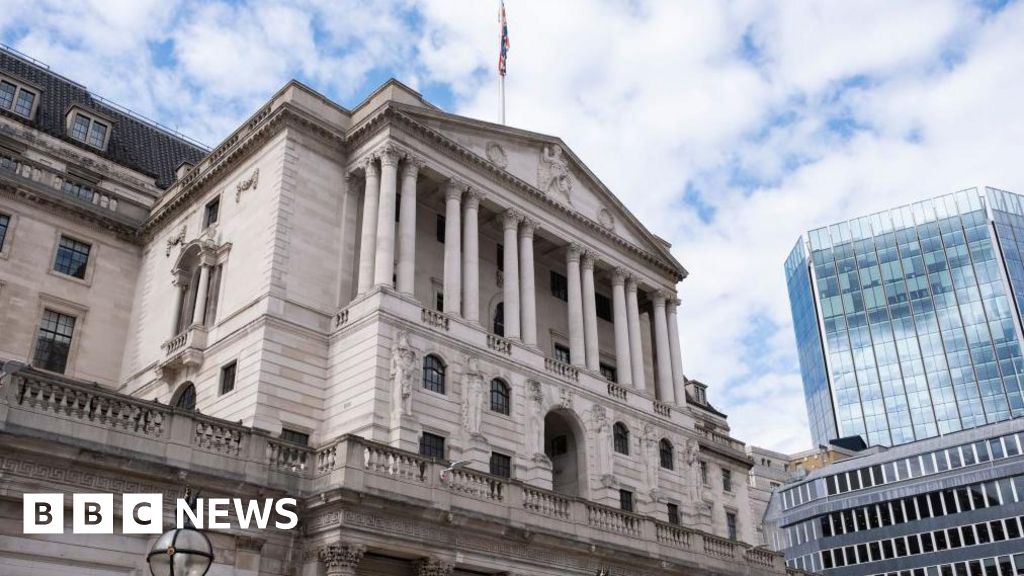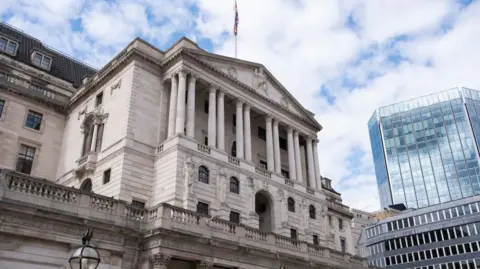UK interest rates expected to be held at 5.25%

By Mitchell Labiak and Kevin Peachey, Business reporter & Cost of Living Correspondent
 Getty Images
Getty ImagesInterest rates are expected to be held at 5.25% for the seventh time in a row by the Bank of England on Thursday.
Despite inflation hitting the central bank’s target level for the first time in three years, most economists have predicted rates, currently at a 16-year high, will not be cut.
They believe the Bank will wait to see if inflation stays at 2% in the coming months, with a first rate cut in the autumn now looking more likely than the summer.
The Bank’s decision comes in the run up to the general election, with policies for the future of the UK economy a key battleground for political parties.
After data revealed inflation fell to 2% in the year to May, the Conservatives said it proved their “difficult decisions” were paying off.
However, Labour responded saying pressures on family finances were “still acute”.
The Bank of England is independent of the government and its main role is to keep inflation, which measures the rate consumer prices rise at, stable at 2%.
In response to high inflation, the Bank in recent years has raised, and then kept interest rates at a high level in an attempt to slow it down and ease the cost of living.
Laura Suter, AJ Bell’s personal finance director, said it would be “very unlikely” that the Bank would cut rates during an election campaign.
“It’s highly likely the Bank will want to wait to see the outcome of the election and the final economic plans before making that first cut,” she added.
“With no meeting in July, that means all eyes are now firmly on the August meeting for our first potential cut to rates.”
Analysts also said a rates are unlikely to be cut because because of services inflation, which reflects prices for cinema tickets, restaurant meals and holidays, remaining higher than expected.
Higher interest rates has meant the cost of borrowing money has increased for things such as mortgages, credit cards and loans, however, returns on savings have risen.
The theory behind rising rates is that it will slow inflation, but it can also drag on economic growth as businesses may put off investment or hiring, which could mean less jobs being created.
Last month, the governor of the Bank of England Andrew Bailey said policymakers needed to “see more evidence” that price rises have slowed further before cutting interest rates, but that he was “optimistic”.
Paul Broadhead, the Building Society Association’s (BSA) head of mortgage and housing policy, said rates being left unchanged would come as a “disappointment” to mortgage holders and would-be borrowers.
“A cut would have provided a little much-needed optimism to homeowners and first-time buyers,” he added.
According to data from the BSA released on Thursday, more than half of people surveyed think the deposit required to buy a home is too high. For first time buyers, the figure is two-thirds.
The average first-time buyer needs a household income of more than £60,000 to get onto the property ladder, according to data from Zoopla on Thursday.
Housing costs
Both the Labour Party and the Conservatives have each accused the other of failing to match promises on housing which, in turn, would raise costs for home buyers or renters.
The Conservatives said they were offering a better deal on stamp duty, by permanently abolishing the levy for first-time buyers purchasing properties up to £425,000.
However, analysts say stamp duty is primarily paid by those buying larger homes, or in more expensive areas. Potential savings would not benefit everyone, as some would not need to pay anyway.
Meanwhile, Labour said its more ambitious plans for energy efficiency in rental homes would protect tenants from higher energy bills.
Questions remain on whether their proposals would be achievable, following concerns raised by charities over the quality of insulation fittings under government schemes.
Interest first started being hiked from near zero in 2021 as prices starting to rise quickly after Covid lockdowns ended as demand for goods and services soared.
Energy prices then rocketed following Russia’s invasion of Ukraine, which drove inflation to a 40-year-high of 11.1% in October 2022.
Related
Youth football teams hold minute’s silence for 10-year-old Poppy Atkinson
Youth football teams and grassroots clubs across the country have held a minute’s silence at the start of their games to commemorate a 10-year-old girl who di
Girl’s death sparks minute’s silence at football matches nationwide
10-year-old Poppy Atkinson was killed when she was struck by a car during a training session at Kendal Rugby Club in Cumbria. Clubs from Leeds to London
Liverpool fans’ Uefa claim can be heard in England, judge…
The high court, sitting in Liverpool, heard Uefa had relied upon the principle that English courts will not inquire into the legality of actions by foreign gove
Alan Shearer’s Premier League predictions including Manchester United vs Arsenal
Caption: Alan Shearer?s Premier League predictions credit: Getty / Metro After some impressive results for English sides in Europe the focus is












